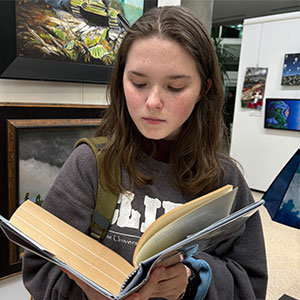Erin Reed will conduct archival research and deepen her knowledge at one of the world’s leading centers for Shakespeare studies and early modern literature.
As a high school student, Erin Reed would often turn to Shakespeare’s Twelfth Night when the world felt overwhelming. She found comfort in Shakespeare’s playful dialogue and complex characters in the play about love and mistaken identity. But the text offered more than just literary enjoyment, it gave Reed valuable insights into human nature.
“Shakespeare helps me understand how people think and act and gives me courage to go after what I want, while also teaching me how to communicate more effectively with others,” Reed says.
Those early readings proved not only to ease her nerves but also to lay the foundation for a future as a budding Shakespearean scholar. This spring, Reed will take her Shakespearean analysis to the Folger Shakespeare Library Colloquy.
The Folger, renowned for its vast collection of early modern literature and its dedication to scholarly research, has traditionally been a space for graduate students and established scholars. Reed and a select handful of undergraduates from around the country will gain access to the Folger’s rare archival materials in the first program specifically for undergraduate students.
In the ten-week program, Reed will explore consent and power within politics, social issues and economics in early modern works. Reed and the other participants will visit the Folger in Washington, D.C., and present a project to the public to showcase their findings.
“This program is a huge honor,” Reed says. “It’s going to help me grow as a researcher and allow me to contribute to the field in a way I hadn’t thought possible at this stage in my career.”
As a first-year English and philosophy student who is also in the Honor’s College, Reed quickly realized her need for a mentor. She struck gold in finding Holly Crocker, a Carolina Distinguished Professor of English and director of the Humanities Collaborative, who encouraged her to work towards a career in Shakespearean scholarship and guided her through applying for a Magellan Grant.
Reed’s Magellan research investigates the public’s condemnation of authoritative women in part of Shakespeare’s Henry VI—research she’ll refine using the Folger archives and present at Discover USC in April. One conflict in the play revolves around a noblewoman who is banished for having consulted a witch.
"There’s something about looking at how women navigated public life in the 16th century and seeing the parallels to today," Reed explains. "Recognizing these patterns is the first step to understanding how we can make real change."
Crocker also encouraged Reed to apply for the Folger Colloquy.
“This is a significant honor for Erin and for USC,” Crocker says. “This program will allow Erin to sharpen her research skills, pursue research for her senior project and meet other students and faculty who will help her grow as a scholar. I see this as a career-launching opportunity.”
This opportunity at the Folger, Reed believes, will be transformative—not just for her academic growth but for her broader career aspirations.
"This experience is going to push me out of my comfort zone in the best way," Reed says. "I’ll be learning from some of the best minds in the field, and that’s going to help me become a stronger scholar and a better teacher."
Reed hopes to pursue a Ph.D. in English and eventually become a professor who can inspire the next generation of students to appreciate literature’s ability to teach empathy and understanding.
“Literature teaches us how to understand people and that makes life a little less daunting,” Reed says. “When you understand people, you cannot truly hate them.”
